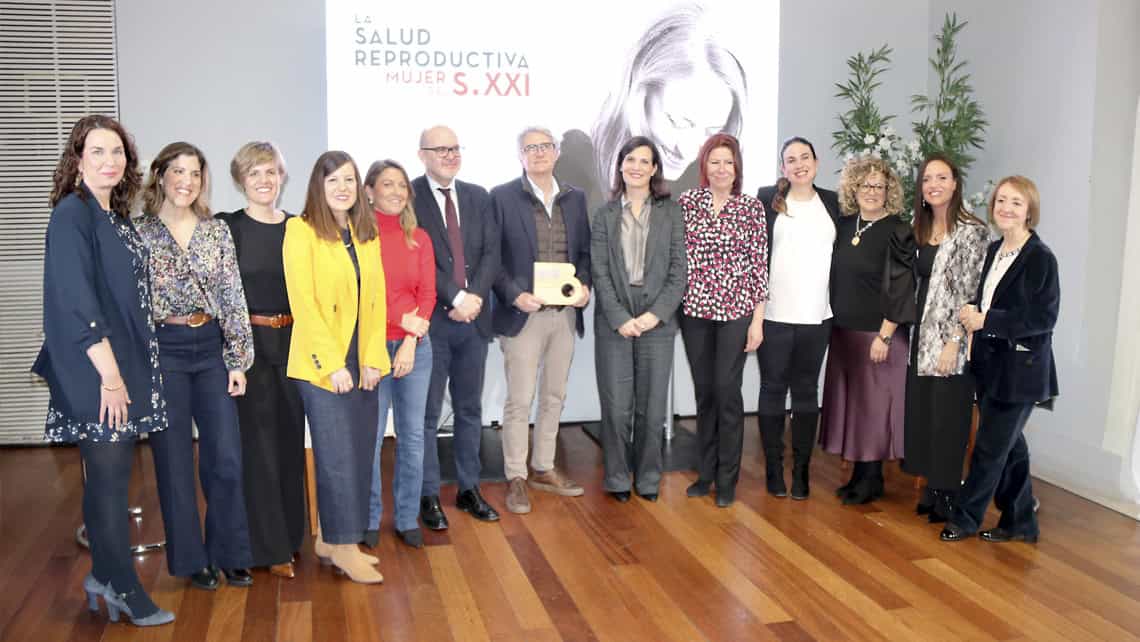Fertility experts analyse the present and future of women’s reproductive health in Albacete
March, 14th 2025

- The 3rd ‘The reproductive health of women in the 21st century’ Meeting brought together health professionals, authorities and experts to discuss the current challenges of this medical discipline.
- Dr Andrea Bernabeu highlights the importance of reproductive medicine in society as a discipline that allows us to offer ‘increasingly effective, safe and personalised solutions’.
Instituto Bernabeu held, with great success, the 3rd ‘Reproductive health for women in the 21st century’ Meeting in Albacete, the city in which the clinic celebrates its 10th anniversary. The event, which took place on March 13th at the Gran Hotel in Albacete, brought together specialists from Instituto Bernabeu, public health professionals, students and general public interested in learning about current advances and future challenges in reproductive medicine.
Dr Andrea Bernabeu, medical director of Grupo Instituto Bernabeu, highlighted during the opening speech the social importance of this medical discipline: ‘Maternity is increasingly delayed and the average age to have the first child is now over 32 years old. In Spain, 12% of babies are born thanks to assisted reproduction techniques’. In this sense, Dr Bernabeu stressed that ‘reproductive medicine is, more than ever, a necessity for our society, but it is also a discipline in constant evolution, which allows us to address these challenges with increasingly effective, safe and personalised solutions’.
In the conference, leading experts in fertility and assisted reproduction analysed the current situation and shared their knowledge on the challenges facing reproductive health in Spain. Topics covered included the latest advances in reproduction, the impact of lifestyle on fertility and the medical challenges of the future.
Dr. Lydia Luque, coordinator of Instituto Bernabeu Albacete, underlined during her speech the importance of bringing cutting-edge reproductive medicine and collaborating with the public health system: ‘We have had the privilege of working hand in hand with different public health units in Castilla-La Mancha, especially in the province of Albacete. This has been possible thanks to the establishment of collaboration protocols based on mutual trust, with the aim of providing cutting-edge reproductive medicine to all those who have needed it’.
Personalisation of reproductive medicine
The forum featured two round tables. In the first, on the sociological aspects of motherhood in the 21st century, Dr Luque was joined by nurses Elena Muñoz and Cristina Reolid, from Instituto Bernabeu Albacete, at a table moderated by Dr Carmen García, director of the Albacete University Hospital Complex Fertility Unit, and by Mª Cruz Muñoz, coordinator of Primary Care Teams at the Albacete Integrated Care Management.
The second one dealt with personalised applications in reproductive medicine, as well as the use of artificial intelligence, in which Dr María del Mar Pérez, gynaecologist at Instituto Bernabeu Albacete and Nuria Ruiz, embryologist at Instituto Bernabeu Albacete, took part in a round table moderated by Dr María del Rocío Fernández Santos, dean of the Faculty of Pharmacy of the UCLM and by María Sánchez Toledo, embryologist at the University Hospital Complex of Albacete.
Acknowledgement of the Albacete Integrated Care Management System
In addition, during the meeting, Dr Bernabeu and Dr Luque presented an award to the GAI (Integrated Care Management in Spanish) of Albacete, received by its managing director, Dr Alberto Sansón Justel, who congratulated Instituto Bernabeu and its clinic in Albacete ‘for your role, which has been fundamental in the development of reproductive medicine in Albacete’. In his speech, he also emphasised the ‘huge responsibility’ of healthcare ‘with society’ and the importance of collaboration between the public and private spheres: ‘There is only one health and that is the health of the people’.
Also in attendance were different local authorities, including the provincial deputy for Health Francisco García Alcaraz and the councillor for Entrepreneurship of Albacete City Council, Lucrecia Rodríguez de Vera.
The councillor highlighted the importance of the Instituto Bernabeu Albacete because ‘it allows many people to start a family’ and pointed out that ‘its work has an impact not only on patients but also on the scientific and technological development of our city. We are lucky to have a centre in Albacete that is committed to the welfare of our citizens’.
The representative of the provincial institution indicated, for his part, that ‘the work carried out by Instituto Bernabeu in the field of reproduction is vital for those women who wish to become mothers’. In addition, the deputy García Alcaraz underlined the words of Dr Sansón: ‘Health is a common health and Instituto Bernabeu is an example of collaboration between public and private health and collaboration between institutions’, since ‘in terms of health it is important to guarantee the right to reproductive health’.
With this meeting, Instituto Bernabeu reaffirms its commitment to research, dissemination and training in reproductive health.

